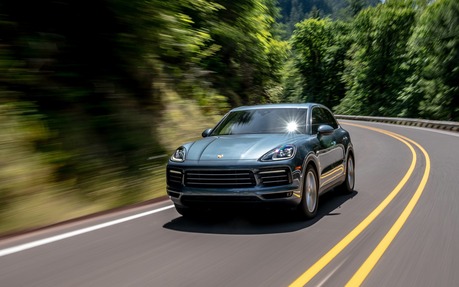2019 Porsche Cayenne E-Hybrid: Successful Mutation
EUGENE, Oregon—For years, we’ve heard how the colossal success of the Porsche Cayenne gave the company the financial resources to develop its prestigious and pricey sports cars, so it was about time the SUV got some love, as well. The 2019 model year ushers in the third generation of the Cayenne, and we get a brand new hybrid variant on top of that.
In addition to a complete redesign and some notable improvements, the midsize luxury SUV now boasts a powertrain, instruments and other systems derived from the 918 Spyder. Seriously. The engineers in Weissach drew inspiration from the 887-horsepower plug-in hybrid sports car to develop components for the new Cayenne E-Hybrid.
- Also: Porsche Recalls 340,000 Cayenne, Panamera Models Globally
- Also: 2020 Porsche Cayenne Coupe: Sportier Looks and Dynamics
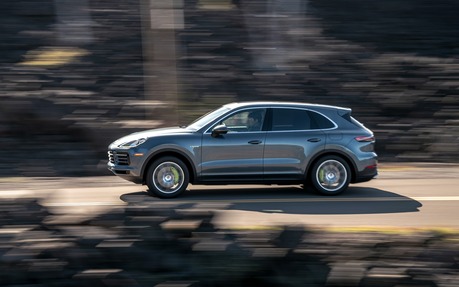
Elegance and Simplicity
The third iteration of the Porsche Cayenne is a clear cut above the previous two in terms of comfort, driving dynamics, ergonomics and overall quality. The E-Hybrid model in particular is 55 kilograms lighter than its predecessor, yet longer, wider, roomier and equipped with more standard features. Credit goes to the aluminum body panels and numerous alloys that contribute to less weight and more rigidity.
Inside, a crystal-clear, high-resolution 12.3-inch touchscreen sits in the middle of a clean-looking dashboard. In front of the driver is the traditional five-dial cluster in 911 fashion, with configurable instruments sourced from the 918 Spyder. A more direct tie to the latter can be found in the drive mode knob located under the horizontal spoke of the beautiful, leather-trimmed steering wheel.
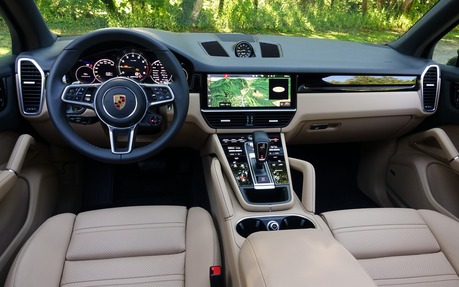
The centre console features touch-sensitive icons and four HVAC controls, plus a rotary controller for the main interface, another for the electronic parking brake, the transmission selector and buttons for the adjustable damping and stability control systems. It’s a much simpler layout than the old one, which resembled a scientific calculator. And it all works like a charm.
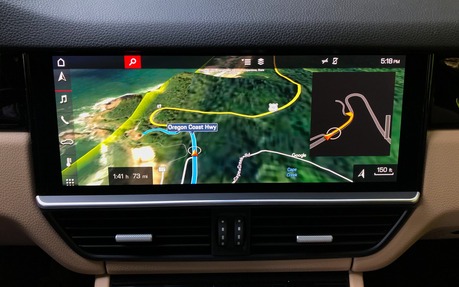
A Sleeper of a Hybrid
Naturally, Porsche designed the Cayenne E-Hybrid powertrain with a focus on performance, but that doesn’t mean it’s not efficient or frugal. The engineers improved the capacity of the liquid-cooled lithium-ion battery by 30 percent, from 10.9 kWh to 14.1 kWh, without increasing its size or weight. They also built a 134-horsepower electric motor with 43 percent more output than the previous unit.
With the 335 horsepower generated by the turbocharged 3.0-litre V6, the 2019 Porsche Cayenne E-Hybrid has a combined rating of 456 horsepower. It can sprint from 0-100 km/h in just 5.0 seconds, reach a top speed of 253 km/h and tow up to 3,500 kilograms (7,716 pounds) with the optional package. The company promises a range of 44 kilometres in EV mode and a fuel consumption as low as 3.4 L/100 km based on the highly optimistic European test standards. The numbers for North America have yet to be announced.
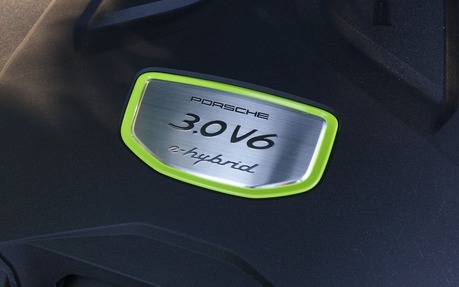
The beauty of the new Cayenne E-Hybrid lies in the near-perfect integration of the two power sources and the seamless transitions between them. It’s a radical departure from the previous generation, which felt hesitating, jerky and even noisy in pure electric driving. Now the vehicle always starts in E-Power mode, just like the 918 Spyder.
You can then switch to Hybrid Auto, Sport or Sport Plus mode at will using the aforementioned knob on the steering wheel. The electric propulsion intensifies in the process and the combustion engine simultaneously charges the battery in Sport Plus mode. Alternatively, you can preserve the battery or resume charging by selecting E-Hold or E-Charge, respectively, on the centre screen.
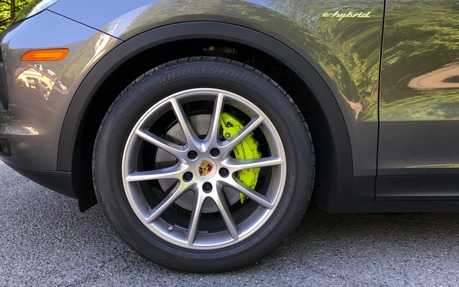
Quiet Strength
I spent the entire media drive using either electric or hybrid propulsion. On the super-slick roads we encountered, I kept switching between Hybrid Auto and Sport Plus modes depending on the frequency and radius of the bends along the way. The differences were immediately noticeable. In Sport Plus mode, throttle response was much quicker and the adjustable air suspension got stiffer while lowering ride height by 20 millimetres. It only takes one push of a button to regain the comfortable ride of the Hybrid mode without relinquishing the potential for lively acceleration.
The available suspension can also vary ground clearance from 132 millimetres (easy access to the cabin) to 244 millimetres (maximum off-road capability). Ground clearance with the metal springs of the standard Porsche Active Suspension Management (PASM) system is still a commendable 210 millimetres. Active rear-wheel steering, which is another option, helps reduce the turning radius from 12.1 metres to 11.5 metres. The benefits in low-speed manoeuvres are obvious. However, the system somehow lessens the sharpness of the steering when the rear wheels turn slightly in the direction of the corner to increase stability at speeds over 80 km/h.
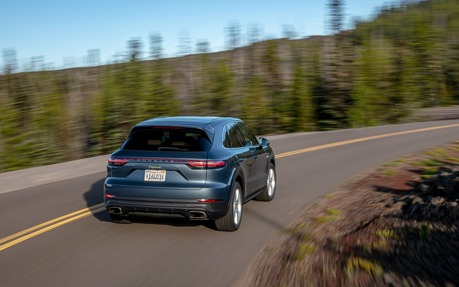
The Verdict
Smooth, comfortable, solid and quiet, the 2019 Porsche Cayenne E-Hybrid is a real success, even though it’s not as sporty as a GTS or as powerful as a Turbo. The hybrid powertrain requires no sacrifice and proves reasonably thrifty, allowing drivers to travel a few dozen kilometres in pure electric mode.
Once again, this vehicle is pretty expensive with a base price of $91,420. You’ll pay much more than that if you start adding some options that come standard on many rivals, like adaptive cruise control or seating memory. But considering the world-class performance, quality and driving dynamics, one could argue it’s worth every penny. As for styling, we’ll let you be the judge.
| Test drive report | |
| Test model | 2019 Porsche Cayenne |
|---|---|
| Trim level | E-Hybrid |
| Price range | $91,420 – $166,620 |
| Price as tested | 166 620 $ |
| Warranty (basic) | 4 years/80,000 km |
| Warranty (powertrain) | 4 years/80,000 km |
| Fuel economy (city/highway/observed) | N/A |
| Options | Premium Plus Package ($9,960); carbon fibre exterior mouldings ($10,300); Burmester audio system ($6,620); illuminated aluminum door sills ($3,565); 18-way power adjustable sport seats with memory ($2,560); ventilated front seats with massage ($3,250); contrasting leather seats ($7,130); air suspension with PASM ($2,480); PDCC Sport suspension ($4,090); rear-axle steering ($1,840); power closing doors ($880); adaptive cruise control ($2,280); head-up display ($1,970); night vision ($2,750); parking assist with surround view ($1,360); Alcantara headliner ($1,930); heated multi-function steering wheel ($600) |
| Competitive models | Acura MDX, Audi Q7, Audi Q8, BMW X5, BMW X6, Land Rover Range Rover Sport, Maserati Levante, Mercedes-Benz GLE, Tesla Model X, Volvo XC90 |
| Strong points |
|
| Weak points |
|
| Editor's rating | |
| Fuel economy | Quite reasonable for such a large SUV with limited EV range. |
| Comfort | Controlled ride, smooth and quiet at all times, very comfortable seats. |
| Performance | Strong, linear acceleration and passing manoeuvres, though it could be sportier. |
| Infotainment | Much simpler and more user-friendly than the old system, but not without a few irritants. |
| Driving | This SUV is solid, highly refined and ultra-capable, yet the drive is not particularly exhilarating. |
| Overall | Buy the new Cayenne E-Hybrid with confidence knowing the powertrain is greatly improved. |
